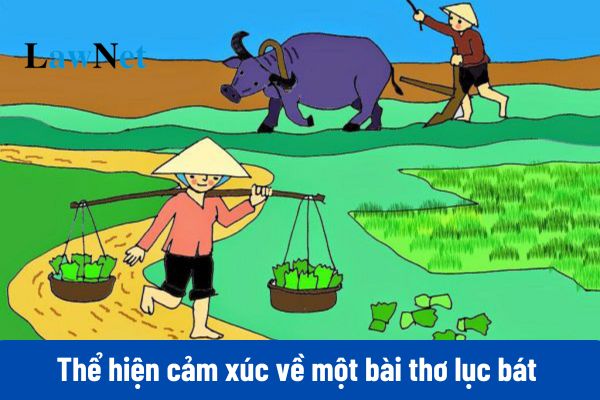What are the sample paragraphs expressing feelings about a six-eight poem in Vietnam? How many periodic assessments must 9th-grade students in Vietnam undergo during a semester?
What are the sample paragraphs expressing feelings about a six-eight poem under the 9th-grade Literature curriculum in Vietnam?
Students can refer to the following sample paragraphs expressing feelings about a six-eight poem under the 9th-grade Literature curriculum in Vietnam:
|
Sample No. 1 This is one of the best folk songs about family affection. The folk song speaks about the loyalty that children and grandchildren devote to their ancestors. It reminds us to be grateful to our forebears, and it extends even further. The imagery compares people to trees and rivers. Trees have roots, and rivers have sources, starting points for their development and proliferation. Similarly, people exist today thanks to their grandparents and ancestors. The folk song uses the familiar lục bát poetic form, presenting a simple and easy-to-understand message urging children to remember their grandparents and ancestors, and not to be ungrateful. Familiar and simple poetic images serve as a reminder of gratitude to previous generations. Thus, the folk song expresses profound gratitude to grandparents, ancestors, and all previous generations from long ago. |
|---|
|
Sample No. 2
|
|
Sample No. 3 "Buffalo, dear buffalo" is the folk song I love the most. With the rhythmic lục bát poetic form, the poem is a confession of the farmer to his cherished livelihood partner, the buffalo. The farmer treats the buffalo with affection and admiration like a family member. He sweetly converses with the buffalo, calling it to plow with him. He doesn't forget to remind the buffalo about the promising future ahead when it works diligently. He also promises that when he has rice to eat, the buffalo will have grass in the field. This detail demonstrates the close-knit, loving relationship between man and buffalo. Thus, the folk song affirms the diligence, kindness, and love for animals of ancient farmers. The image of the ancient Vietnamese farmer has entered poetry like that. |
|
Sample No. 4 Parents are the ones who brought us into this vast world. And then, regardless of the hardships and struggles, our parents raised and taught us to become people. The folk song of our forebears reminds children of the sacred affection, and everlasting gratitude: A father's contribution is like Mount Tai, Parents gave birth and nurtured us. A father's labor is compared to Mount Tai - a high and majestic mountain, symbolizing the immeasurable and inexpressible sacrifices and toil of a father. This mountain grows over time with the support of Mother Earth, and a father's love also becomes more abundant. Using the mountain image to symbolize a father implies the role of a pillar, a firm support for the whole family, carrying the burden of life. We appreciate and understand more the hardships a father endures. As for the mother, there is the grace of giving birth, the mother sacrifices herself for her child's smile and happiness. The water from the source never runs dry, like a mother's immense love flowing along the river of her child's life. That stream makes one think of the pure white milk of the mother that nourished us from infancy. Every drop of fragrant milk embodies the cherished feelings the mother has for her child. The heavy grace compared to the wide sea and high mountains, immense and eternal through time. Hence "the nine-letter island," the parental contribution, we must always remember and show filial piety to our parents. The folk song, with its simple but profound and touching imagery and words, serves as a lifelong reminder of the sacred, immortal affection for parents. |
Note: Information is for reference purposes only!

What are the sample paragraphs expressing feelings about a six-eight poem in Vietnam? How many periodic assessments must 9th-grade students in Vietnam undergo during a semester? (Image from the Internet)
How many periodic assessments must 9th-grade students in Vietnam undergo during a semester?
According to clauses 2 and 3 of Article 7 in Circular 22/2021/TT-BGDDT, the periodic assessment for 9th-grade students in Vietnam is specified as follows:
Periodic assessment
...
2. In each semester, each subject assessed via feedback shall be assessed once in the middle of the semester and once at the end of the semester.
3. In each semester, each subject assessed via both feedback and scores shall be given assessment scores once during the semester (hereinafter referred to as “DDGgk”) and once at the end of the semester (hereinafter referred to as “DDGck”).
...
Thus, 9th-grade students must undergo the following periodic assessments during a semester:
- Subjects assessed via feedback: assessment in the middle of the semester and assessment at the end of the semester.
- Subjects assessed via feedback combined with scores: assessment in the middle of the semester and assessment at the end of the semester.
What are the duties of 9th-grade students in Vietnam in school?
According to Article 34 of Circular 32/2020/TT-BGDDT, the duties of students are as follows:
- Learn and train according to curricula and education plans of their schools.
- Respect their parents, officials, teachers and staff of their schools, and those older than them; maintain solidarity and mutual support in learning and training; conform to the charter and rules of their schools; and abide by the law.
- Take exercises and maintain personal hygiene.
- Participate in group activities of their schools and classes, Ho Chi Minh Young Pioneer Organization and Ho Chi Minh Communist Youth Union; help their families, join physical and social activities and environmental protection activities, and maintain traffic order and safety.
- Protect school and public property; contribute to fostering, preservation and enhancement of school traditions.

